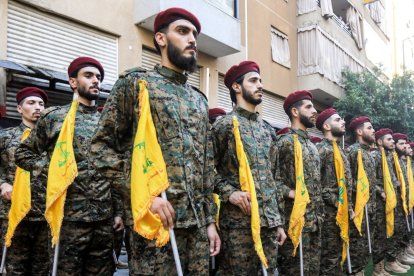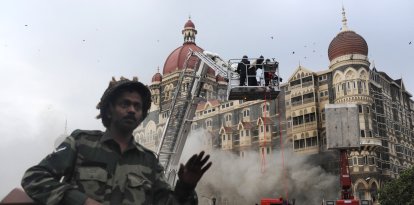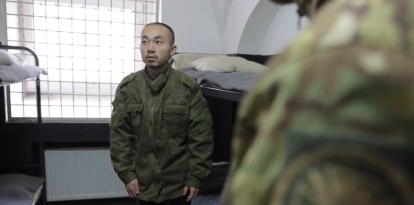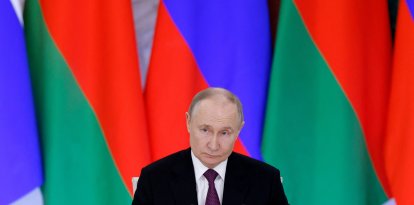Why the pager operation against Hezbollah did not violate international law
A group of experts provided a detailed explanation refuting the claims of leftist organizations and personalities who condemned the tactical strike attributed to Israel in Lebanon and Syria.

Hezbollah terrorists in Lebanon
Experts Arsen Ostrovsky, John Spencer and Mark Goldfeder provided a detailed explanation in an article published recently on Newsweek refuting the claim that the tactical and historic operation attributed to Israel last week against thousands of Hezbollah terrorists violated international law.
The attack, which consisted of sudden and surprise explosions of the pagers and walkie talkies belonging to thousands of Hezbollah terrorists, in what appeared to be an operation orchestrated by Israeli intelligence, turned out to be a historic feat also because of its precision. However, it was met with repudiation from certain leftist personalities and organizations who condemned the attack against the Lebanese jihadist group that happened amidst the conflict the Jewish state faces in Gaza and on the border with Lebanon.
One of the operation's critics was the organization Amnesty International, which claimed that "the mass electronic device explosions across Lebanon and Syria in recent days bear the hallmarks of a sinister dystopian nightmare."
The group added that "international humanitarian law prohibits attacks that fail to distinguish between civilians and military targets and prohibits the use of these types of booby traps," despite the fact that the devices that exploded belonged exclusively to members of Hezbollah.
Far-left U.S. Rep. Alexandria Ocasio-Cortez joined in condemning the anti-terror operation, stating that "this attack clearly and unequivocally violates international humanitarian law and undermines U.S. efforts to prevent a wider conflict." She called on Congress to make "a full accounting of the attack, including an answer from the State Department as to whether any U.S. assistance went into the development or deployment of this technology."
French President Emmanuel Macron also condemned the operation and even communicated with Israeli Prime Minister Benjamin Netanyahu to reproach him for the situation in the Middle East. "You have a responsibility to prevent escalation. There is a diplomatic path. This is the moment to show leadership and responsibility. Your activity in the north is pushing the region to war," the French leader said.
However, the Israeli prime minister was not silent. "Instead of putting pressure on us, it's time for you to put pressure on Hezbollah," Netanyahu responded. "We are going to bring our citizens back home. That is a decision we made this week and we will implement it," he added, in clear reference to the tens of thousands of residents of northern Israel who had to flee their homes because of attacks perpetrated by Hezbollah and who are still waiting to be able to return to their communities.
The words of criticism from these figures were accompanied by many other in the West, in contrast to the joy expressed even by many Arabs and Muslims in the region.
Hezbollah, not Israel, is violating international law
For this reason, Ostrovsky, Spencer and Goldfeder decided to explain in their article the reasons why the operation attributed to Israel falls within the boundaries of international law.
The authors pointed out that since the war broke out in the Gaza Strip following the Oct. 7 massacre perpetrated by Hamas and other terrorist groups in southern Israel, Hezbollah has fired 8,500 rockets at the Jewish state, and each one of them constitutes an unquestionable war crime, as they were fired indiscriminately.
The Lebanese terrorist group's attacks killed 47 people, including 12 children who were hit by missiles while playing soccer in the massacre of the Druze village Majdal Shams in July. In addition, more than 80,000 Israelis have been displaced from their homes in the north of the country by Hezbollah's terrorist offensives.
The experts added that Israel's self-defense is protected by international law, including but not limited to Article 51 of the U.N. Charter, according to which a member of the United Nations has the right to self-defense, individual or collective, if attacked, until such time as the Security Council has taken the necessary measures to maintain international peace and security.
The operation, which Israel has not claimed responsibility for, is fully justified and in complete conformity with international law, the authors insisted. They further remarked that the historic attack disrupted Hezbollah's terrorist capabilities and infrastructure, restored Israeli deterrence and dealt a severe blow to the Iranian-backed radical Islamist group, as it realized that none of its members is safe, including Hassan Nasrallah, its leader.
The authors indicated in the article that it is necessary to understand the context of the conflict and not to be influenced by those targeting Israel. In this regard, they stressed that Hezbollah is a jihadist terrorist organization with a standing army that is financed and supplied by Iran. They added that, like Hamas, Hezbollah has the genocidal objective of annihilating Israel and murdering all Jews.
They also explained that while the use of booby traps in communication devices is prohibited in certain situations, according to Article 7 of the amended Protocol II to the 1980 Convention on Certain Conventional Weapons, the truth is that according to Article 52 of the Additional Protocols to the Geneva Convention I, this type of operation is permitted when the devices are no longer used for civilian purposes, which was the case of Hezbollah's pagers and walkie talkies, since they were used by members of this group to plan terrorist attacks. Thus, these devices constituted legitimate military targets.
Moreover, the Principle of Distinction, one of the fundamental principles of International Humanitarian Law (IHL), indicates that the sides in an armed conflict must distinguish between civilians and combatants, which was taken into account those who carried out the operation in Lebanon and Syria, since the targets of the attacks were only Hezbollah terrorists. In fact, the devices were purchased by the Islamist group and distributed among its members in order to avoid detection by Israeli intelligence services.
According to the laws of war, the parties must also comply with the Doctrine of Proportionality, the authors stated in the article. This rule requires that any anticipated loss of civilian life must not be excessive in comparison to the potential advantage to be gained from an operation. It also states that all necessary measures must be taken to reduce collateral damage.
The military advantage sought with this operation consisted of stopping Hezbollah from launching missiles, enabling more than 80,000 residents of northern Israel to return to their homes and causing significant damage to the terrorist group's capabilities.
In fact, 4,000 Hezbollah members were injured by the pager explosions, and only a small number of civilians were harmed, indicating that this was a precise and proportional operation, thus complying with international law.
RECOMMENDATION




















